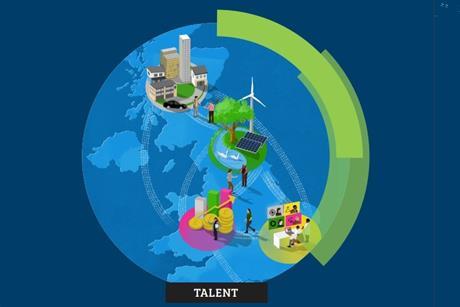Employers
Information on providing work experiences for young people
Future workforce facts*
- The skills needed by modern chemical scientists are in the areas of digital technologies and sustainability.
- The chemical sciences workforce is projected to grow 30% faster than the overall UK labour market (2022-2032).
- 71% of the 2035 workforce have already begun their career.
- That means it will continue to need a strong supply of chemistry graduates.
- Most career paths in chemistry currently under-utilise apprenticeships.
- Expanding vocational training for chemical science roles will help bring more diversity into the sector.
- Chemical scientists’ median salary is £38,590. That’s £7,500 more than the UK median average for other job postings. (Lightcast data 2023).
- Outreach and work experience are the best ways for students to understand the variety of career options and see their future in chemistry.
*Source RSC Future Workforce and Education Pathways report
As chemical science employers you have a crucial role to play in encouraging young people to consider a career in chemistry. Just talking positively about your professional life and what you do could be enough to inspire some young people to explore a career in chemical science.
We know that offering work experience is a great way to showcase your business to the local community and line up future employees. ASPIRES 3 research highlights that access to good-quality, engaging chemistry work experience can shape career direction.
If you or your organisation can offer more experience to a young person considering a career in chemistry you might consider:
Industry placements:
Industry placements are part of the new T Level two-year qualifications for 16 to 19 year olds in England. This qualification is equivalent to 3 A levels and aims to develop in-demand skills for businesses, nurture talent and prepare young people for the workplace
Industry placements can vary in length but must last for a minimum of 315 hours (approximately 45 days). You can offer industry placements as a block, series of blocks, day release or a mix of these, depending on what works best for you, the training provider and the student.
You will partner with a local college or training provider to be matched with the right student. They will be able to help you with paperwork and support you with managing the placement.
For more information, and how to find the right student for your business:
Read Work experience — connecting your business to your future workforce
Visit T Levels on GOV.UK and read the Employer Guide to help businesses understand how to host an industry placement. This includes details on what is expected of employers during the placement.
Further guidance on employer industry placements. from the Department for Education.
Virtual work experience
Online encounters and experiences that take place between students and employers are happening more due to the Covid-19 pandemic, while face-to-face contact is not possible. This approach helps young people find out about industries and careers that may not otherwise be accessible due to geography, health and safety concerns, and other practical and accessibility barriers. It can also teach young people about digital skills, teamwork and communication in an online environment.
But it is much harder to give the hands-on-experience and works best for project work that would not require lab-testing equipment.
Our top tips
- Set up an online induction for young people to meet different team members.
- Ensure there is two-way interaction between students and employees
- Provide online training modules
- Set a task or targetted project work relevant to your workplace
- Provide feedback on how actively the student participated. Feedback on any task or piece of project work that was set.
Work experience
Involves students carrying out real work tasks or duties, similar to an employee, but with the emphasis on the learning aspects of the experience. Work experience occurs on your premises; the vast majority of pre16 work placements last for one or two weeks, but post-16 the experience can be more varied in length depending on the course being followed.
A workplace visit
This is where individuals or groups of students are guided round the workplace to watch a range of employee activities or work processes. It gives students a chance to see a work environment first-hand, observe work processes and talk to employees about their roles. It can also be an opportunity to investigate a topic or question related to an aspect of chemistry they are studying.
Job shadowing
When an individual student is assigned to ‘shadow’ an individual employee as they do their job and it allows close observation of jobs which for reasons of complexity, safety or security cannot be actively undertaken by the student. This can be particularly helpful for areas of the chemical sciences that struggle to provide work experience or to get students involved in their primary work processes.
Other resources for employers
- Complete the Employer Standards framework and tool developed by The Careers & Enterprise Company. It’s a new framework to help raise the quality of business outreach with education at scale. It sets out what best practice is in terms of employer outreach in careers education. Careers & Enterprise Company links schools and colleges to employers in ways that scale from a one-off 1 hour to providing work experience regularly.
- Providing experiences of workplaces
- Apprenticeships
- Education and Employers | Inspiring the Future
- Not just making tea…Reinventing work experience guidance from the government guidance on structuring work experience placements.
- Learning in lockdown engineering-based company offering a week-long work experience programme
Chemistry’s contribution: workforce trends and economic impact
Science and scientific skills play a critical role in the UK economy and society.
Industry leaders’ urgent call for government to keep the UK chemistry talent pipeline flowing
Industry leaders have called on the government and education bodies to help school pupils discover chemistry career paths
What chemical scientists earned in 2023
The median salary increased from the 2021 results, but pay disparities remain.
Best practice
Advice and case studies from employers working with schools and young people
-
Work experience — connecting your business to your future workforce
pdf, size 749 kb -
Providing experiences of workplaces
pdf, size 202 kb -
Engaging young people with a career in chemistry
pdf, size 2.5 mb -
Apprenticeships: benefits to employers
video -
Science industry placements at Climax Molybdenum
Climax Molybdenum is a production and conversion facility for ferromolybdenum, used as a strengthener for steel. The laboratory team at Climax have hosted their first Science T-level student on an industry placement. This case study is all about how this has supported the technical team and been a development opportunity for staff as well as the student.
pdf, size 142.34 kb -
Careers in Context 2020: Can Do Guide for employers from the Careers and Enterprise Company
pdf, size 993 kb











